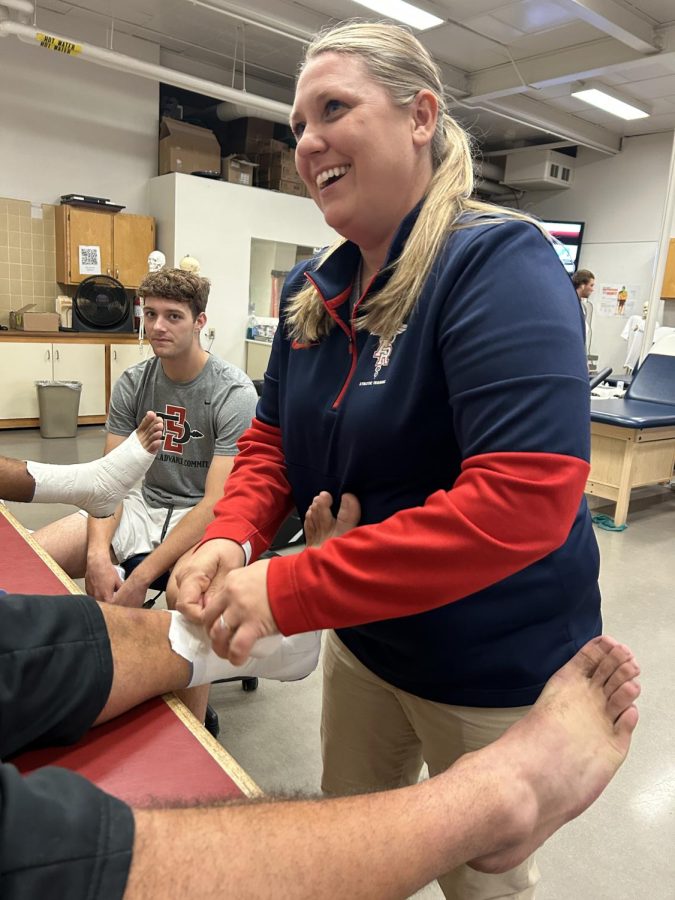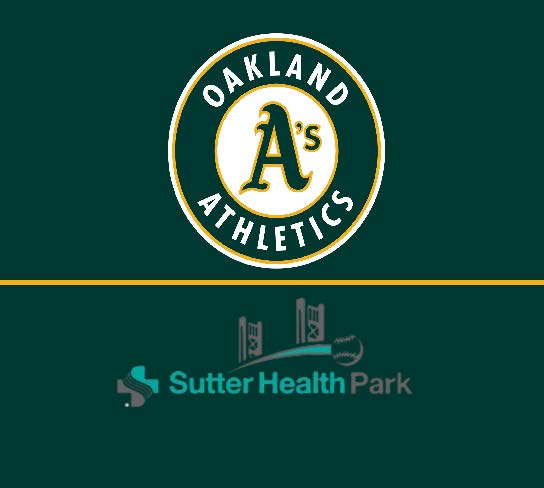Trainer Michelle Whitehead helps ARC athletes perform at their best
Her work is at the crossroads of sports and medicine
All in a day’s work: Michelle Whitehead, an athletic trainer with the American River College Kinesiology & Athletics department, wraps a football player’s ankle on Nov. 15. (Photo by Gina Gangursky)
Enter the athletic training department at American River College at any given time, and you are bound to see multiple athletes roaming in and around the station where the competitors have their injuries examined. It’s a lively hub, surrounded by medical beds and professionals at their computers documenting injuries and the follow-up care received.
To the side, is the athletic trainers’ office. It’s piled high with administrative documents and has the whiteboard record of games, both on-site and away. Athletes call out to one another and share stories of the latest battles fought, in everything from volleyball to football, tennis and diving and many sports in between.
At the center of it all is Michelle Whitehead, one of four athletic trainers at ARC. She can be found deftly wrapping athletes’ feet while talking it up with them light-heartedly, but don’t be fooled by the ease with which she goes about her work.
According to the ARC website, athletic trainers are “highly qualified, multi-skilled health care professionals who collaborate with physicians in an array of medical services…so that the athletes can return to full activity as quickly and safely as possible.”
At ARC for 12 years now, Whitehead is a force of nature: She’s a wife, mother of three young children, instructor of two night classes at California State University, Sacramento and a full-time instructor and athletic trainer at ARC.
Whitehead’s ARC story began when she was hired under a temporary status in 2011. After one year in that capacity, she was asked to work at the college permanently, and ARC is where she wants to stay.
“Athletes will ask me what I want to do in the future. I tell them that this is it. For them, community college is a stepping stone,” Whitehead said. “To be here and teach was my ultimate goal. [ARC] is where I want to be.”
In high school, Whitehead played softball and basketball. It was then that she learned about the athletic training profession, and she was hooked.
“I knew that [athletic training] was what I wanted to do. I never looked back,” Whitehead said.
Originally from Truckee, California, Whitehead attended Brigham Young University in Utah, where she earned a Bachelor of Science degree in athletic training. Later, she received a master’s degree in kinesiology, with an emphasis in sports performance at CSUS, while working chiefly with the women’s soccer and gymnastics teams. She arrived at ARC in 2011.
Treating up to 75 athletes a day and 500 athletes total, Whitehead speaks quickly and laughs easily. A great deal of skill, a sense of humor and a caring demeanor go a long way when tending to athletes who care deeply about their performance and have sustained sometimes serious injuries.
Aurora Meneghetti, who is on the ARC women’s volleyball team, landed on another player’s foot during a game in 2021 and has been seen by Whitehead consistently since her injury.
“Last spring, I sprained my ankle pretty bad …so I’m making sure my ankles are taped nice and snug. Michelle does a good job of listening and then figuring out what is wrong,” Meneghetti said. “I feel really comfortable with her.”
Sometimes, though fortunately not often, players have to be told that they can’t continue in the sport anymore due to severe injuries.
“We could be diagnosing a concussion, and when you take them out of the game, you have to explain to them: You tell them that you want them to be able to read to their child, turn the pages of a book,” Whitehead said. “That it’s not just about this game, it’s about their future.”
With the demands of the constantly changing medical field, understaffing at times and notoriously low pay, athletic training can be a challenging profession. Through it all, Whitehead says she is grateful for the work she does.
“The best part of my job is when you have genuinely made an impact on an athlete and they come back and say ‘Thank you, thank you for what you did, I appreciate you,’” Whitehead said. “I call [the players] ‘my athletes.’ I’m part of their team.”













Katie Bozzi • Dec 12, 2022 at 7:58 pm
Excellent article highlighting the importance of skilled professionals that often time go unnoticed! Thank you as a mother of a student athlete who attends ARC!